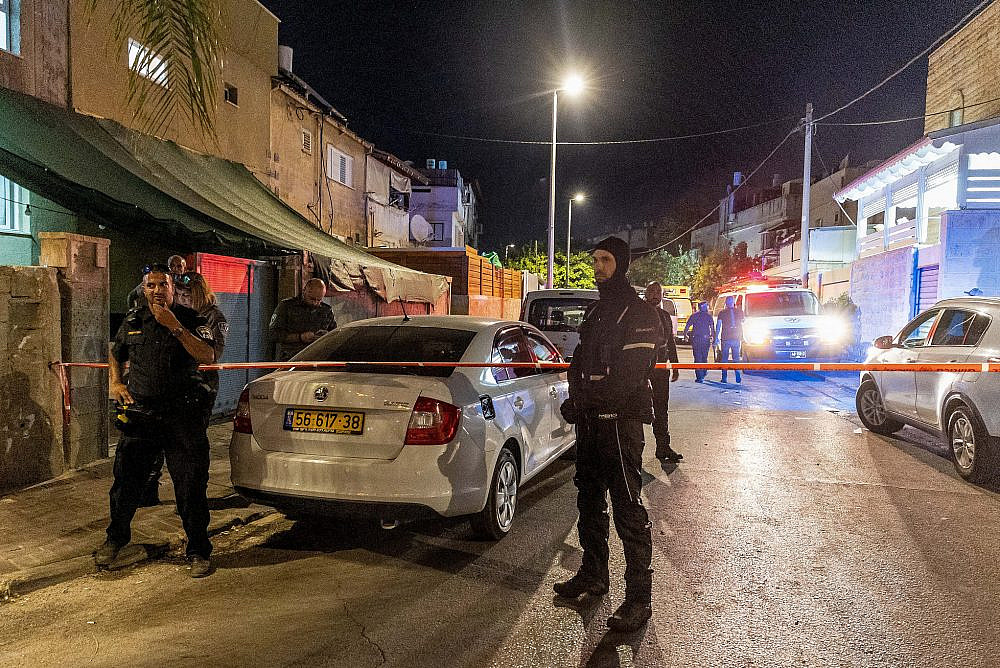During the Israeli government’s weekly cabinet meeting in Jerusalem on Feb. 19, residents from the central city of Lydd/Lod held a demonstration outside the Prime Minister’s Office, demanding that the government take immediate action to address the alarming rise of crime and violence in the locality. The protest, which was organized by Lydd’s right-wing mayor Yair Revivo and attended by other municipal officials, came on the heels of five murders over 10 days in the city, including a car bombing of an alleged member of a criminal organization.
Addressing Prime Minister Benjamin Netanyahu, Mayor Revivo issued a statement reading: “With all due respect to the judicial reform [plan], you must immediately devote time to changing the governing legislation, so that the Shin Bet can come in to deal with crime, that illegal gun owners will be brought to prison, and that the criminals be removed from here immediately.” Among various cabinet members who joined the protest was National Security Minister Itamar Ben Gvir, who promised to push the government to “increase the budget [for law enforcement] and bring more police officers to the city of Lod.”
The protest was the latest event at which Revivo and Ben Gvir have demanded a strong response from law enforcement authorities in Lydd. In late January, Ben Gvir toured the city with Revivo and several senior police officials, saying that the mayor had invited him for an “emergency visit” following a “series of nationalist and criminal events” in the city. The day before that visit, Ben Gvir told journalists that the country is on the cusp of a second “Guardian of the Walls” — the name of Israel’s military operation during the events of May 2021, which saw a war on Gaza and a campaign of police repression against mass Palestinian demonstration. The solution to the current state of affairs, the minister said, is to “strengthen the police and establish a national guard.”
The uprising two years ago, dubbed the “Unity Intifada” or “Dignity Intifada,” had consumed Lydd along with other so-called “mixed cities” in Israel. As Palestinian protesters took to the streets, gangs of Jews and Arabs vandalized property and attacked residents of the other national group. Buses full of armed Israeli settlers from the occupied West Bank arrived in Lydd each night to “defend the Jews,” often in coordination with police forces. Musa Hassuna, an Arab resident of the city, was reportedly shot dead by a Jewish Israeli, while Yigal Yehoshua, a Jewish resident, was killed after young Palestinians pelted his car with rocks, according to state prosecutors. Dozens of other residents were injured and dozens more arrested during those weeks and in the months after.
The State Comptroller’s report on the events, published the following year, said that the Israeli police and security services were not adequately prepared for the developments, and did not engage with the situation in a professional manner. Meanwhile, critics say that little has been done since May 2021 to address the large, discriminatory disparities in socioeconomic rights and services between Arab and Jewish residents, which were regarded as a main source of grievance that led to the eruption of violence in Lydd and other mixed cities.
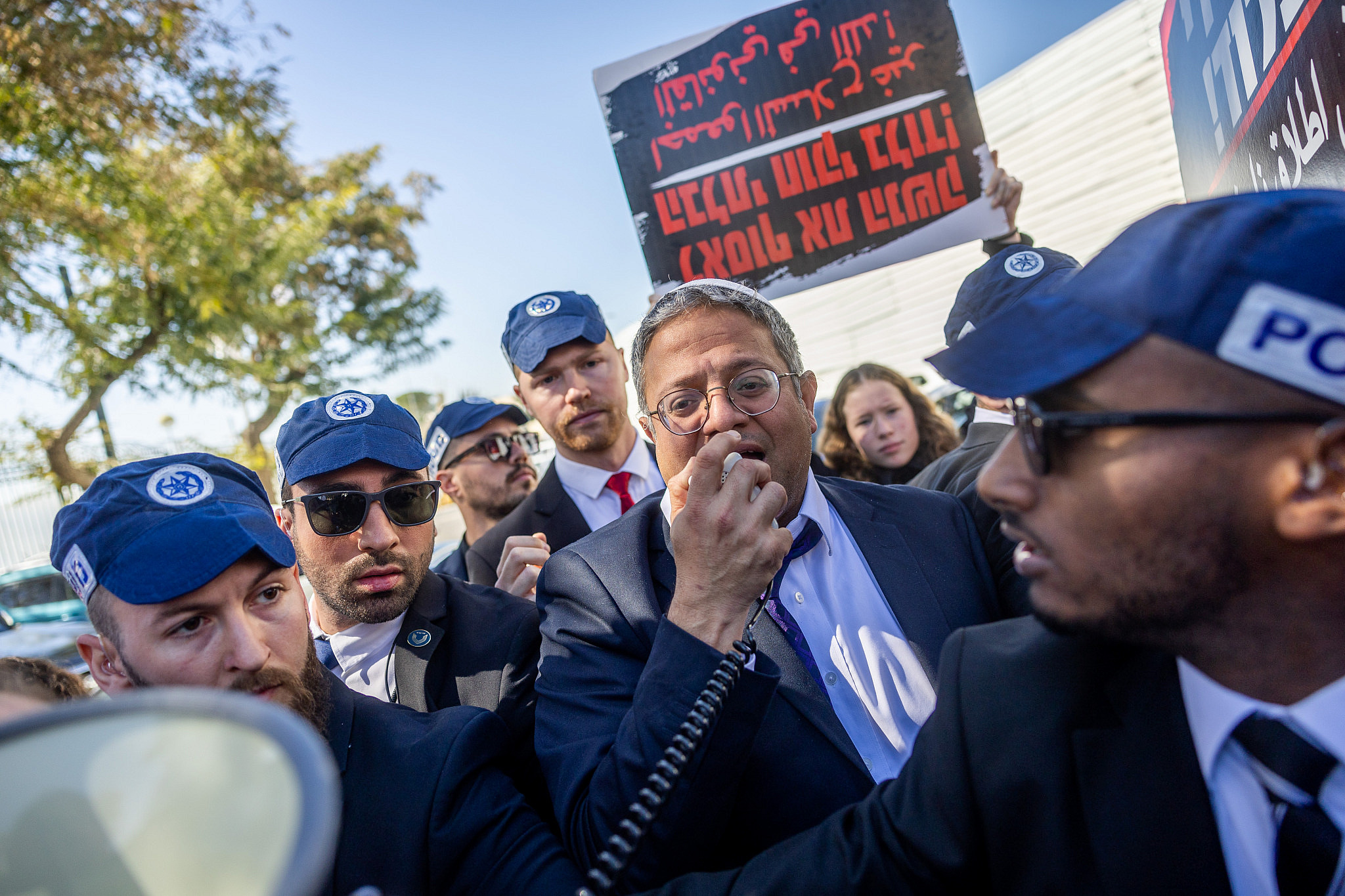
“The truth is, Ben Gvir doesn’t especially scare me,” said Fida Shehada, a Palestinian activist in Lydd who coordinates the Women Against Weapons coalition and was a member of the city council until she resigned a few months ago. “His statements are repetitive and he is trying to please the thousands who voted for him in Lydd. The problem is that the mayor [Revivo] speaks the same language as him. Connecting the rampant crime in the city to nationalist issues is their only way to maintain the collective incitement against all the Arabs in Lydd.”
Tayser Sheban, a lawyer and activist from the city who represents several young Palestinian citizens who were arrested in the wake of May 2021, indicated that Lydd is a favored site for Ben Gvir to visit during tense political periods. Sheban noted that the uprising itself had occurred a week after Ben Gvir, then a Knesset member, had toured Lydd with Revivo amid growing Palestinian unrest against police repression at Al-Aqsa Mosque Compound and Damascus Gate in Jerusalem. According to Sheban, Ben Gvir’s visit last month was driven by a similar political atmosphere, having taken place following violent incidents in Jerusalem, Jenin, and other places these past weeks.
Ben Gvir’s latest tour, said Sheban, was ostensibly about dealing with violence and crime in the city; however, “instead of addressing ways to get rid of crime, the minister and the mayor went after the Arabs and made false statements claiming some of the recent events occurred on a nationalist basis,” said Sheban. “Revivo agitated against the [Arab] residents, hoping to obscure his failure in the city and the failure of the police to guarantee security, and to justify the lack of basic services [for Arab society] that has led to the deterioration of education and other areas.”
‘Let Arabs kill each other’
Sheban said that Ben Gvir’s appearance left a noticeable impact in the police’s ensuing actions in the city’s Arab neighborhoods. After several gunshots were reported later that evening, “the entrances to several Arab neighborhoods were closed as collective punishment in response to the shooting attacks, ones that we Arabs suffer from. They started arresting people who left to go to work [the following morning].” The municipality claims that the closing of the neighborhoods was carried out by the police “in order to collect illegal weapons” and that “the municipality doesn’t have the authority to direct the police on how to carry out their operations.”
Revivo recently stated in the media that many of the conditions that enabled the events of May 2021 have remained unchanged, and that the Israeli government faces a crucial challenge in addressing these problems. Revivo echoed these sentiments in a conversation with Local Call, saying that “since Guardian of the Walls, we haven’t been able to build a new police station in Lod, or reinforce the police, or increase the budget for police patrols, or increase the budget for coordinating between these various bodies, or pass legislation in the Knesset — laws that I introduced, wrote, and submitted to Knesset members.”
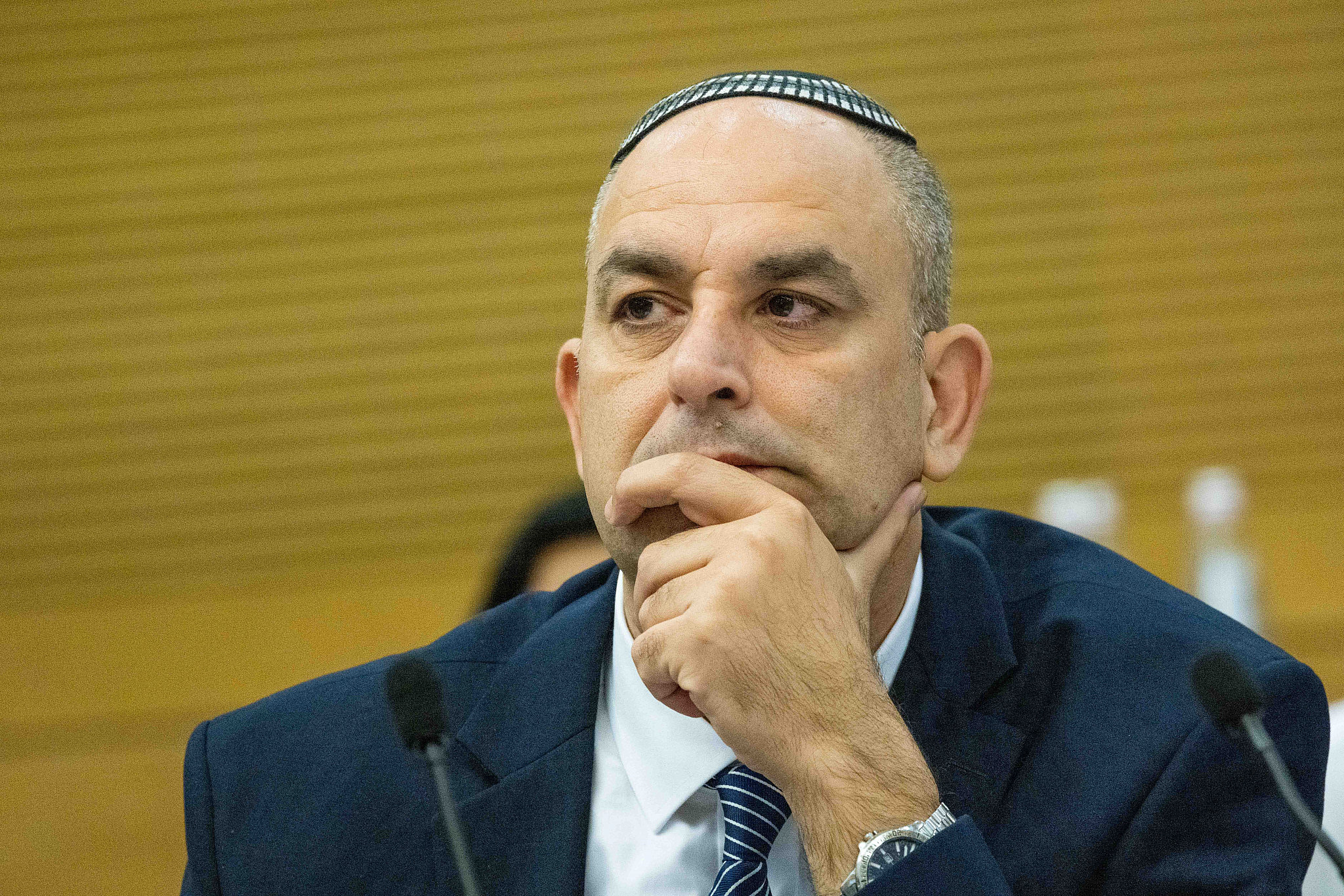
The mayor continued: “Today in Lod, sadly, we all feel the criminal terror, and it’s because of this that Ben Gvir came to Lod at my invitation. He received 5,000 votes in the city; residents put their faith in him and his statements. And so Lod will be his ultimate test, to see if he can succeed in putting us back on track or not. He received an hours-long overview [of the situation] from me, from the municipal administration, from the chief of police [Kobi Shabtai], and from the head of the central police commander [Avi Biton]. He also heard from and listened to Jewish and Arab residents. We’re waiting for him to take action.”
However, Revivo refuted Ben Gvir’s claim that the visit took place in response to nationalist incidents in the city, rather than criminal ones. “Thank God, the relationship between Jews and Arabs [in the city] went back to normal after Guardian of the Walls, and relatively got back on track to how it was before May 2021. Maybe not 100 percent, but in general, there is quiet and there isn’t a lot of friction. But I am afraid that what happened in the month before Guardian of the Walls will occur again, when criminal terror rose and rose, and then erupted into nationalist actions.”
Revivo agrees with Ben Gvir that the country may be witnessing the beginnings of another phase that will force another major operation like that of two years ago. “They always asked me how I predicted the disturbances in Guardian of the Walls in May 2021, because [a few weeks earlier] I had issued a letter to the leaders of the state saying that within 30 days, something terrible was going to happen. I could sense the social and criminal networks, and I knew that it would turn nationalistic. I feel the same way today.”
For Shehada, the activist and former councilwoman, Revivo has himself to blame for the city’s static conditions. “Why does the mayor think something will change if he hasn’t changed a thing?” she wondered. “He continues with the same policies and doesn’t try, for example, to seriously engage with the struggle against crime. He insists that crime is connected to nationalism, because that’s easier for him. It is also what the entire establishment intends to do, in Lydd and everywhere else: to let crime run rampant and let Arabs kill each other. It doesn’t bother the state, and on top that, they can use it to incite against Arabs.”
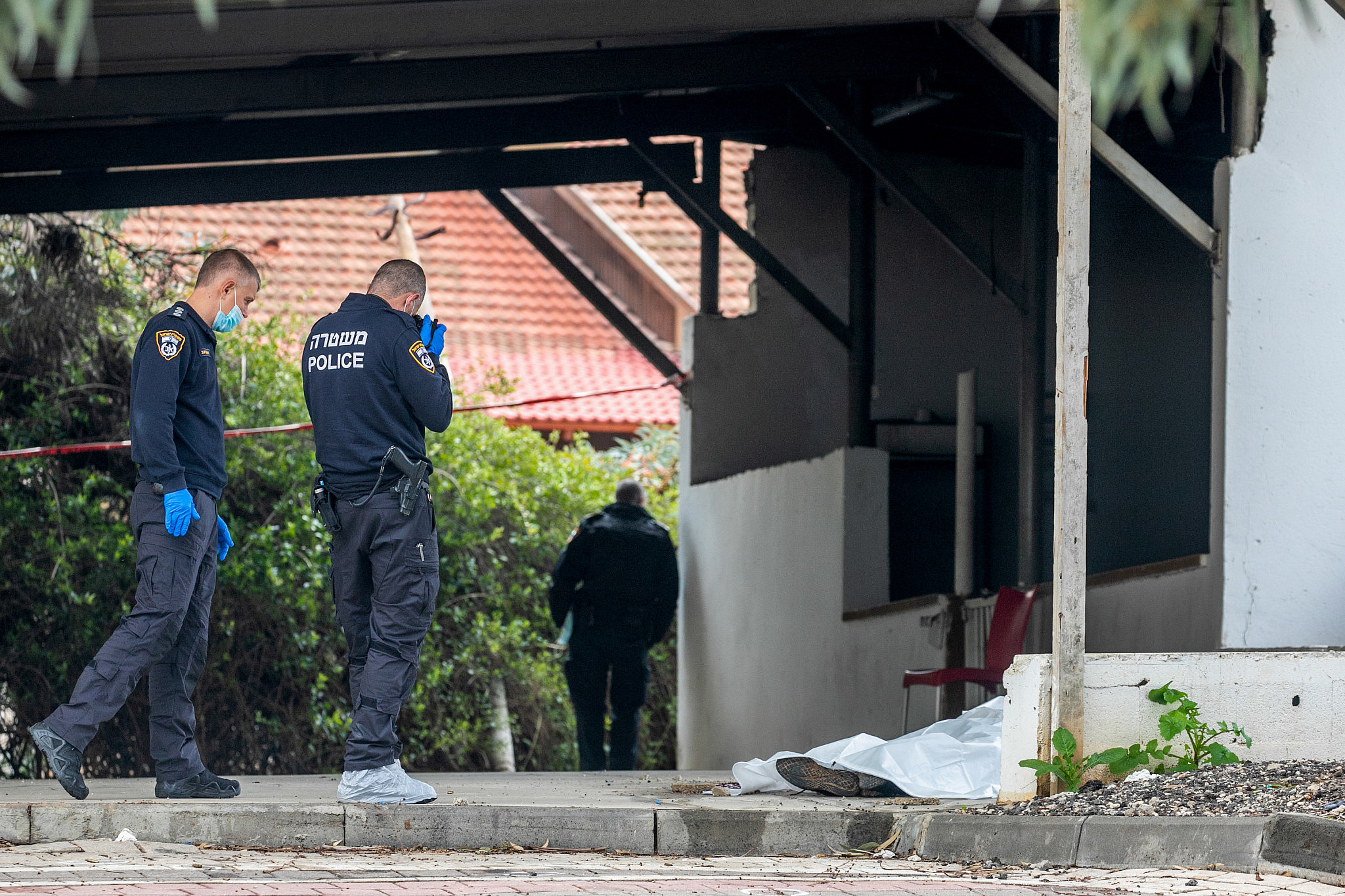
At the same time, Shehada continued, there is a huge gap in the discourse of Israeli political officials and the realities on the ground. “It’s a little funny that none of these things have any meaning for the young people involved in crime,” she said. “They don’t know who the minister of national security is and what his office does, and it doesn’t matter to them. The headlines in the Israeli media after Ben Gvir’s visit — which claimed that there were multiple shootings in Lydd in defiance of him — were funny. These crimes happen every day in Lydd, regardless of his visit. It’s very possible that the person who opened fire [that evening] has never heard Ben Gvir’s name.”
‘We don’t have anything left to fight for’
While dismissing Ben Gvir’s pretext about a nationalist backdrop for his recent visit, Revivo insists that there is still a strong connection between local crime and Palestinian nationalist activities. According to him, “Arab citizens were the source of weapons” used during the May 2021 events. “Today there are some 400,000 illegal weapons in Israel. Criminals seem to have more weapons than the army. The weapons that were used in the recent attacks [in Jerusalem and elsewhere] also seem to have come from criminal arms dealers. The answer is a reform in governance.”
Israeli officials’ attempts to connect Palestinian crime and nationalism “doesn’t surprise us,” said the lawyer Sheban. “But it doesn’t scare the residents of Lod. The truth is that Arabs in Lydd don’t have anything left to fight for. Our lands were confiscated and we don’t have any real property. Only our existence as human beings living in our homeland — that’s what we have left, and despite this, they [the Israelis] still fight us over it.
“The Palestinian, after 70 years … has gotten used to attacks [from Israel],” Sheban lamented. “Hundreds of young people were arrested during the May 2021 events, [some] are still in detention, and it’s possible that those whose sentences have ended will be arrested again.”
Still, he continued, “In the Dignity Uprising, despite all the victims and despite the high price they paid, the people of Lydd didn’t surrender. In contrast with what Ben Gvir and Bezalel Smotrich claim, there are no [grand] plans or intentions among Arabs. On the contrary, the ones preparing [for confrontation] are the Garin Torani (‘Torah nucleus’),” referring to a movement of nationalist-religious Jews who settle in “mixed cities” with the goal of further Judaizing the localities.
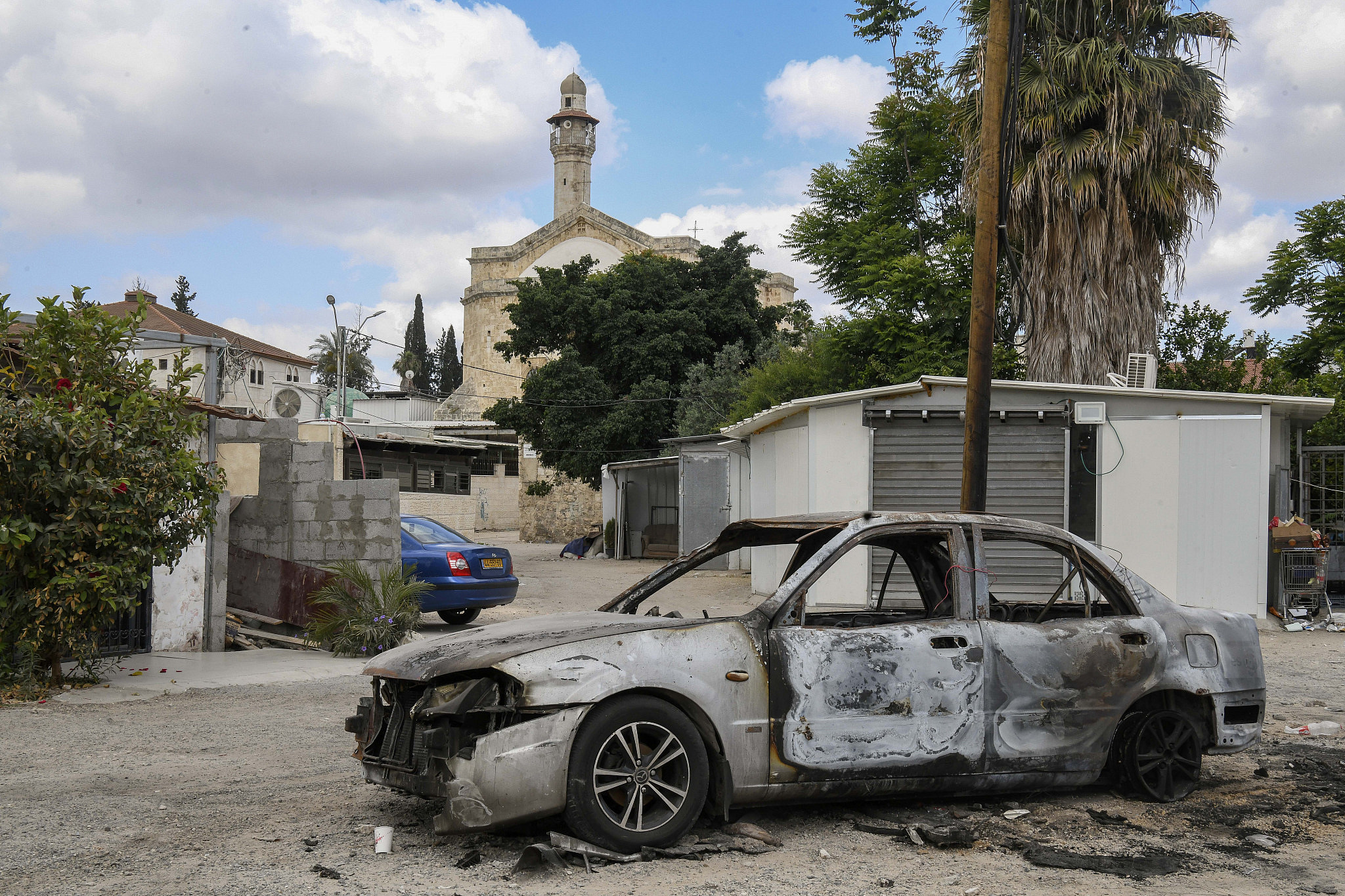
Sheban recalled how “One of the activists in Garin Torani told me a while back that this time, they would be totally ready. Indeed, they have received more funds and new families have joined them. They now hold influential positions in the municipality and have succeeded in forcing an Arab council member to resign. And today they are talking seriously for the first time about silencing or lowering the volume of the muezzin [the mosque official who makes the call to prayer]. Yes, there were attempts in the past and statements from the mayor, but today their talk is much more serious.”
‘Every argument turns into a nationalist event’
Municipal elections in Israel are set for October this year, and as of now it looks like Revivo will run again for Lydd’s mayorship. He believes that he has good reason to have the support of the city’s Arab residents: “They know my ideas [on crime] very well. I have been calling for them for years, the first and only person in the State of Israel who is talking about this burning issue. I am the one who worries about them. They know that I get a lot of messages thanking me for bringing these issues to the citizens of Israel and to the government, because they, the Arab residents, are the first to suffer from crime.”
He continued: “They [Arab citizens] live in fear, under threat, in the shadow of crime families and the bullets that whistle by day and night and that don’t distinguish between people when they injure, or, God forbid, kill. When there is a fight between gangs or tribes, the one who gets killed is not the big criminal, but rather his student relative, the glass worker, or the carpenter.”
Revivo said that the state was not doing enough to get rid of crime in the Arab sector, which he blamed on the fact that it didn’t matter to key officials in centers of power based in other parts of the country.
“I remember when [Jewish criminal organizations] started blowing up cars in the parking lots of luxury buildings in Tel Aviv, where judges, journalists, lawyers, and other high-class people live — then the Israeli police started a war against them,” he said. “Unfortunately, crime in the Arab sector will affect all of Israel, and only when it reaches the crème de la crème in the luxury towers will the state actually go out and try to clamp down on crime. The time has come to deal with it, to stop crime and to bring back quiet — for both Arab and Jewish citizens living in crime-filled areas.”
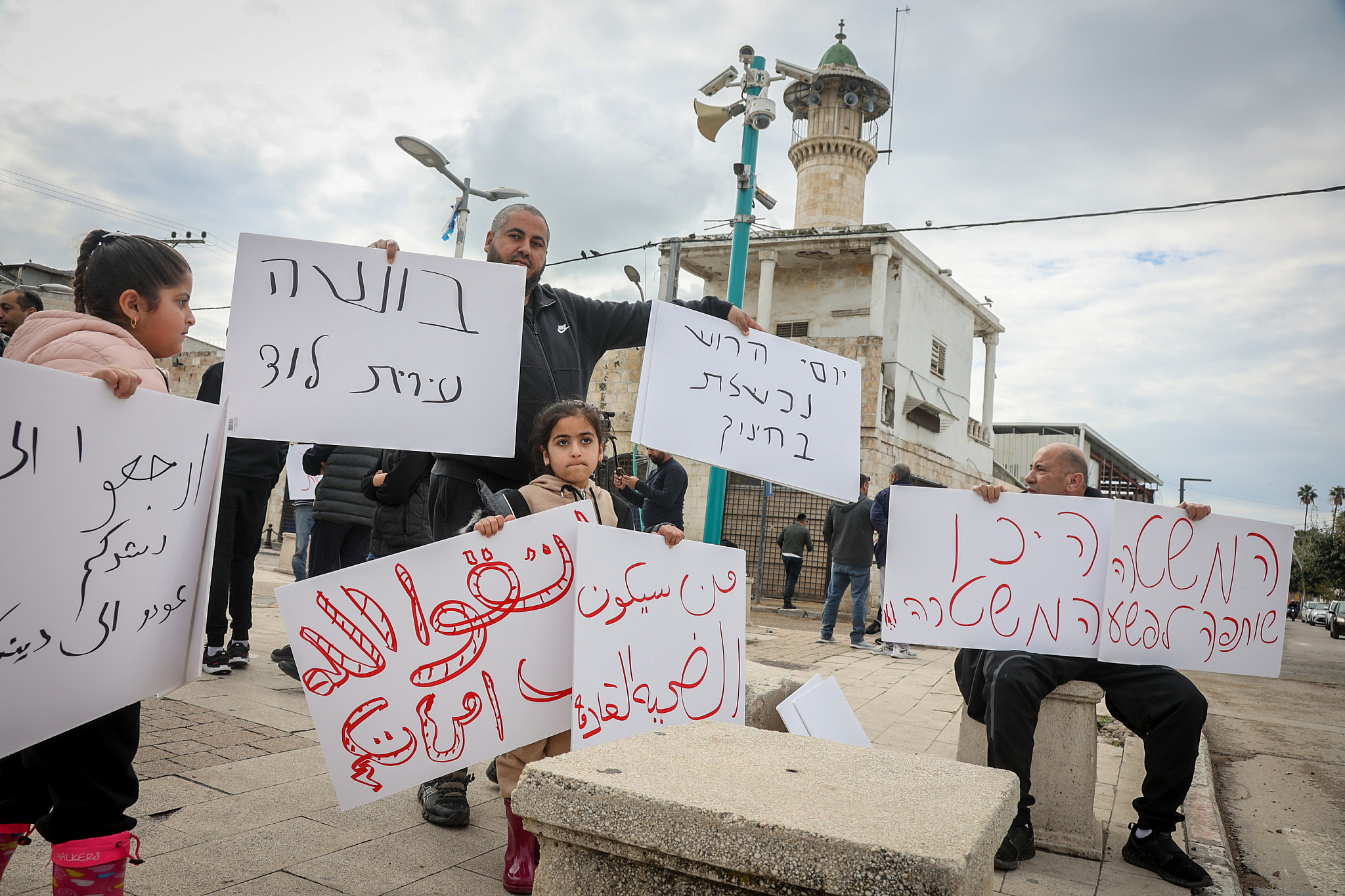
According to Sheban, though, there are more racist motives at play in the city’s policies toward its Arab population, who have tried to assert their community’s rights and welfare in spite of the obstacles against them. “Lod has never been targeted in this way. Since the Arab political parties united [in local elections] and received six seats — a third of the city council — Israelis have felt that the Arabs in Lod have suddenly become a central artery. Doctors, lawyers, business owners … that’s what started to bother the [Jewish] extremists in the city, and since then, the policies harming us have grown.”
The structural discrimination that defines much of the city’s daily life has thus remained unaddressed by the authorities, stressed Sheban. “The issue is not just verbal racism or their negligence in the war on crime, but also in the lack of housing programs, in the evacuation of Arab residents from buildings run by Amidar [a public housing company owned by the Israel Land Authority], in the deliberate neglect of services — all of these have increased in the last few years, especially under Revivo’s leadership. Those who came before him dealt with Arabs arrogantly, and would provide them only with some services just to get rid of them.
“As for those [Israelis] who intentionally harass Arabs,” Sheban added, “in order to make Arabs feel despair and push them to leave the city, the best way to do so is to connect everything to the national struggle and to let extremist Jewish groups spread in the city. Today, every argument between a Jew and an Arab in Lydd turns into a nationalist event, even something as small as a car accident. That means Lydd is a place that can explode at any moment.”
A version of this article was first published in Hebrew on Local Call. Read it here.


